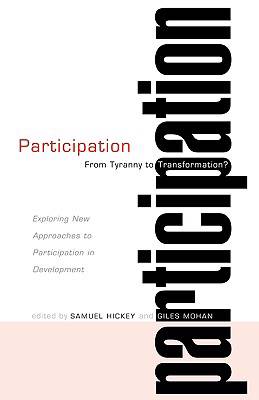
- Afhalen na 1 uur in een winkel met voorraad
- Gratis thuislevering in België vanaf € 30
- Ruim aanbod met 7 miljoen producten
- Afhalen na 1 uur in een winkel met voorraad
- Gratis thuislevering in België vanaf € 30
- Ruim aanbod met 7 miljoen producten
Zoeken
Participation - From Tyranny to Transformation
Exploring New Approaches to Participation in Development
Samuel Hickey
Hardcover | Engels
€ 195,45
+ 390 punten
Omschrijving
Participatory techniques have established themselves in both project implementation in developing countries and community interventions in industrial countries. Recently, participation has been fashionably dismissed as more rhetoric than substance, and subject to manipulation by agents pursuing their own agendas under cover of community consent. In this important new volume, development and other social policy scholars and practitioners seek to rebut this simplistic conclusion. They show how participation can help produce genuine transformation for marginalized communities. This volume is the first comprehensive attempt to evaluate the state of participatory approaches in the aftermath of the "Tyranny" critique. It captures the recent convergence between participatory development and participatory governance. It revisits the question of popular agency, as well as spanning the range of institutional actors involved--the state, civil society and donor agencies. The volume embeds participation within contemporary advances in development theory.
Specificaties
Betrokkenen
- Auteur(s):
- Uitgeverij:
Inhoud
- Aantal bladzijden:
- 304
- Taal:
- Engels
Eigenschappen
- Productcode (EAN):
- 9781842774601
- Verschijningsdatum:
- 1/10/2004
- Uitvoering:
- Hardcover
- Formaat:
- Genaaid
- Afmetingen:
- 141 mm x 224 mm
- Gewicht:
- 467 g

Alleen bij Standaard Boekhandel
+ 390 punten op je klantenkaart van Standaard Boekhandel
Beoordelingen
We publiceren alleen reviews die voldoen aan de voorwaarden voor reviews. Bekijk onze voorwaarden voor reviews.








